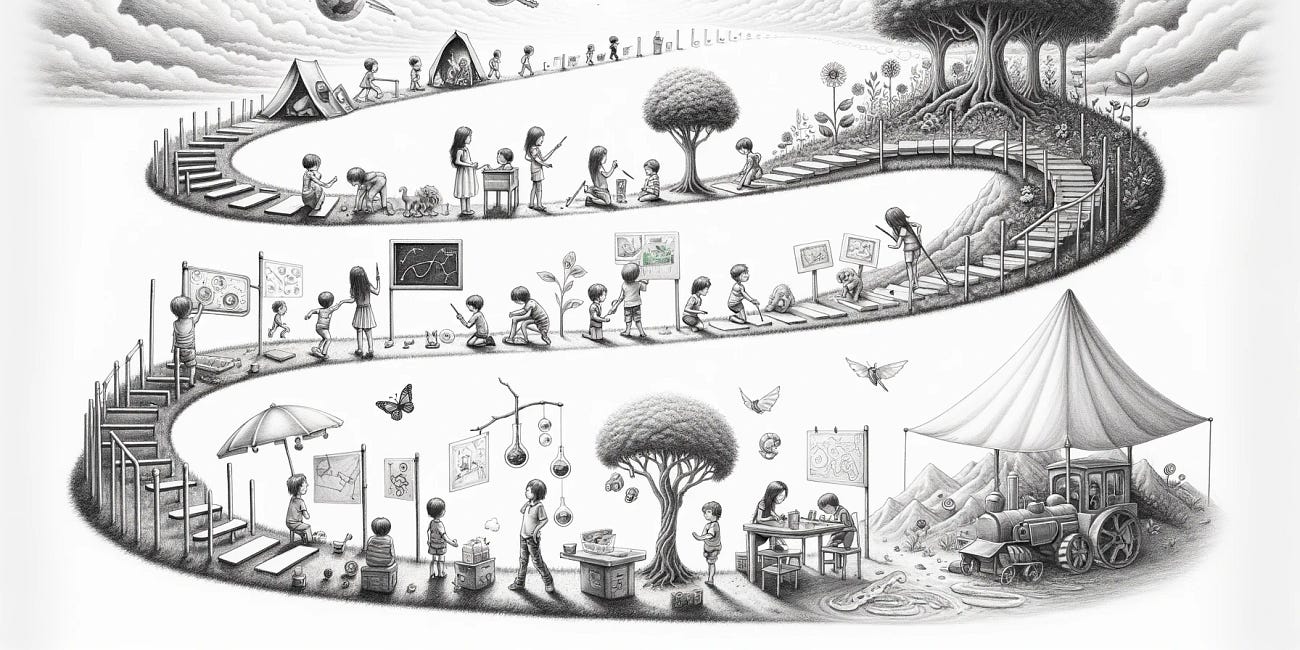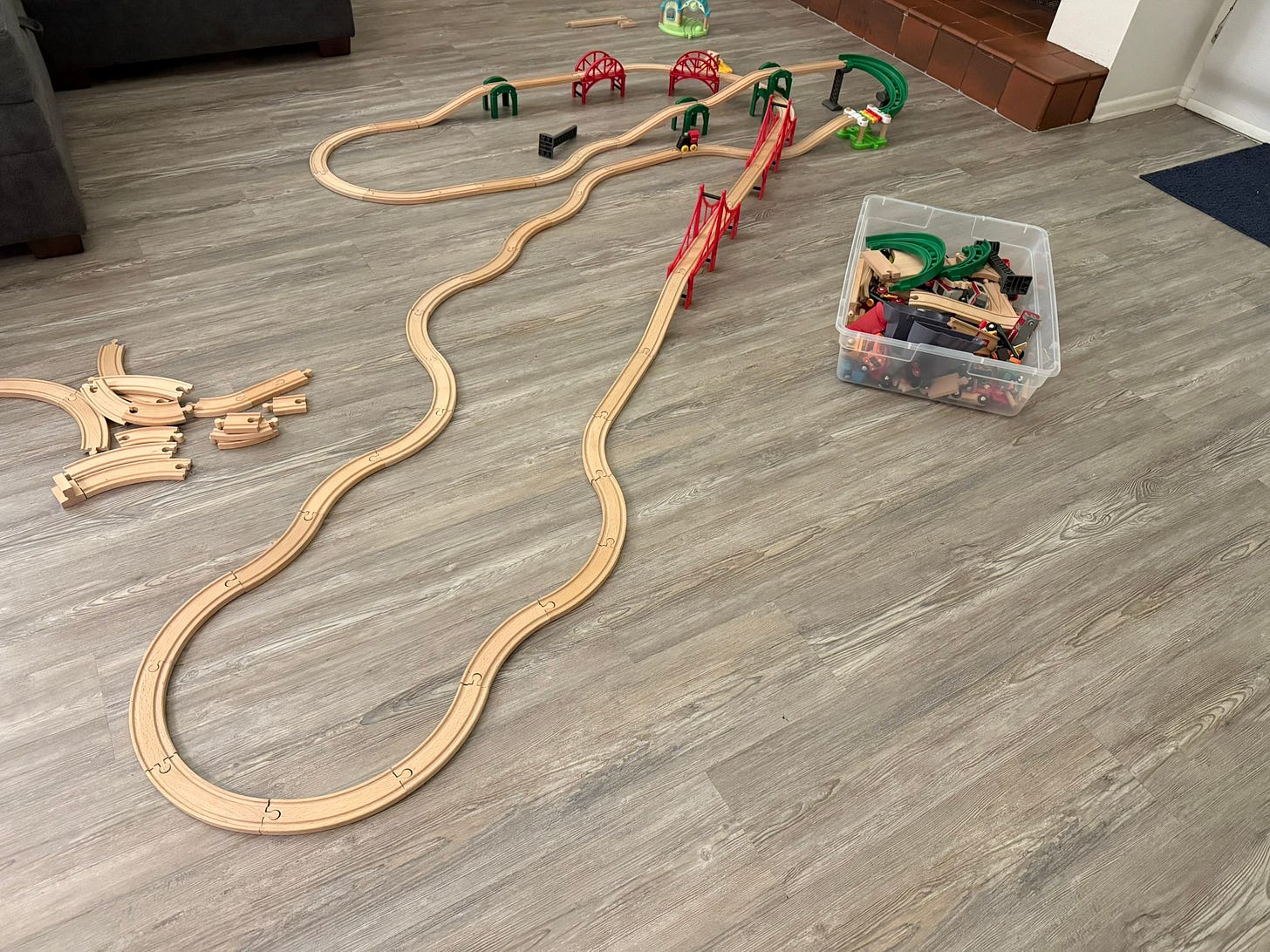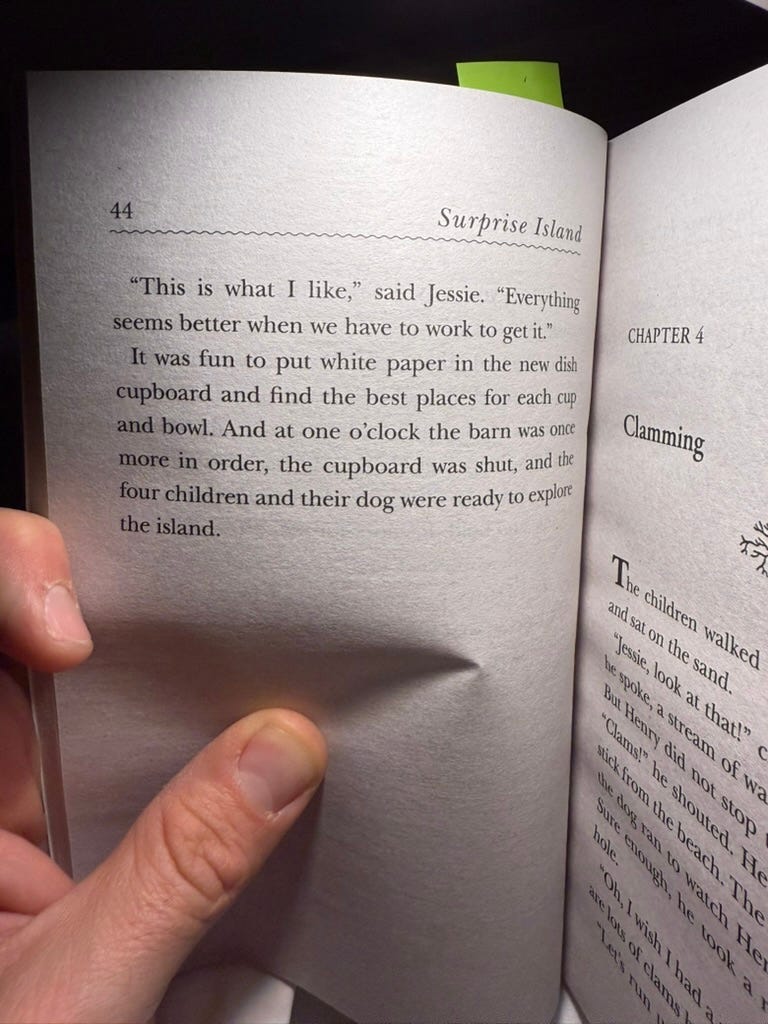Technique's Deception
How Jacques Ellul helps us understand the difference between education and schooling
Thank you for being here. As always, these essays are free and publicly available without a paywall. If my writing has been valuable to you, please consider sharing it with a friend or supporting me as a patron with a paid subscription. Your support helps keep my coffee cup full.

It was long claimed that technique was neutral. Today this is no longer a useful distinction. The power and autonomy of technique are so well secured that it, in its turn, has become the judge of what is moral, the creator of a new morality.
Jacques Ellul, The Technological Society
It's quite a time to be an educator. There are lots of questions in the air about the future of education, many of them fueled by AI. But much, if not most, of the conversation around AI and education is not really about education at all. It's about schooling.
School is to a factory as education is to a garden. In recent days, I've been reading Jacques Ellul more closely. His magnum opus The Technological Society is a goldmine of insight about AI, even though it was written over seventy years ago. Ellul and his ideas are just one more reason I'll continue to beat the drum that I've been banging on for years now: the best way to address AI has nothing to do with AI in particular. It has to do with a more fundamental understanding about the nature of technology and the way it shapes our culture.
Understanding the undercurrents
You should be reading the reports from the frontiers about what AI can do and where the cutting edge is heading. That will tell you what is happening. If you want to know how and why, stop scrolling your social media feeds and pick up some Franklin, Ellul, Illich, Postman, and McLuhan.
The core idea in The Technological Society is the concept of technique. This is perhaps the most challenging part about digesting the wisdom of the past. Ellul’s translated French isn’t quite as digestible as your typical Tweet. But stick with me. Here's Ellul:
The term technique, as I use it, does not mean machines, technology, or this or that procedure for attaining an end. In our technological society, technique is the totality of methods rationally arrived at and having absolute efficiency (for a given stage of development) in every field of human activity.
The pursuit of absolute efficiency in every field of human activity. Sound familiar?
What Ellul is getting at here is crucial if you want to understand the big-picture goal of modern AI as we are seeing it being developed today. It is hard to imagine a more perfect example of technique than AI and its relentless push toward automation and efficiency. Sociologist Robert K. Merton gives a slightly different (and more comprehensible) definition in the foreword.
Technique refers to any complex of standardized means for attaining a predetermined result. Thus, it converts spontaneous and unreflective behavior into behavior that is deliberate and rationalized. The Technical Man is fascinated by results, by the immediate consequences of setting standardized devices into motion...Above all, he is committed to the never-ending search for “the one best way” to achieve any designated objective.
We are that technical man. Fascinated by results, committed—nay obsessed—by the "never-ending search for 'the one best way'."
Education vs. School
Thinking about education through the lens of technique is eye-opening. School is defined by technique. The most obvious example is grades.
Grades provide a metric to be optimized. Numeric grades add to this by providing an illusion of precision. To the casual observer, grades have meaning. Assignments are designed with questions, each question is worth a certain number of points, and one can evaluate the work and assign points correspondingly. Add up the points, divide them by the total available, and get a percentage. Easy enough.
Of course, grades do have meaning. They just don’t mean quite what we think they do. Anyone who has been on the side of writing instead of taking such a test knows that grades are an arbitrary and subjective assessment. There is a stick to measure against, but that stick is chosen. The grade at the end is simply a judgment of another human who designed the test, decided on the weightings, and assessed the result. But while they are subjective, their quantiative glimmer creates the illusion of objectivity.
While grades are the first example, they are certainly not the last. On a larger level, the whole idea of credentialing is just a grade in disguise. Grades and credentials are not meaningless, but the meaning that they have is not built as solidly on the foundation of the knowledge and skills that we imagine they represent.
While everyone and their mother is rushing to invent the latest and greatest way to integrate AI into their courses, we ought to operationalize AI in another way.
What if, instead of jumping to use AI to do what we already do in school faster and more efficiently—searching for "the one best way" to help students get higher grades and faster credentials—we use this instead as an opportunity to rethink the whole thing? What if, instead of using grades as a tool to credential students, we reframed assessment as a way for students to see their areas of weakness and their opportunities for growth no matter how successfully they were able to clear the bar?
Education is not about grades. It's not about credentials. It's not even primarily about acquiring knowledge or learning skills.
Education is about forming humans. It's about looking into the past and seeing a reflection of ourselves. It's about studying the great works of literature in the hopes that we might more deeply understand our own limitations, our own brokenness, and our own dreams. It's about appreciating the wonder of the natural world and taking part in the joy of discovering its intricacies and using it to inspire our own creation. In short, it is about deepening our own humanity.
The False Promise
The great lie of AI is the false promise of technique—that we can pull ourselves up by our own bootstraps to fix ourselves and our world. That in searching for a more efficient way, we can find technological solutions to human problems. There is no salvation to be found in efficiency.
What our world needs is not more or better schools. We need education. A return to an authentic, humble, bold, deliberate, reflective, and courageous way of cultivating ourselves and the people around us. Ellul again.
We have already seen, in connection with technical self-augmentation, that technique pursues its own course more and more independently of man. This means that man participates less and less actively in technical creation, which, by the automatic combination of prior elements, becomes a kind of fate. Man is reduced to the level of a catalyst. Better still, he resembles a slug inserted into a slot machine: he starts the operation without participating in it.
We need to see the lie of technique for what it is—the false promise of enlightenment without effort. We need to fight back against a reality where humans are reduced to catalysts.
Ellul saw, well before our modern times, the prison of technique in all its incarnations. What he offers is a way of seeing how the single-minded pursuit of efficiency, which promises to free us, in the end enslaves us instead. The first step of finding a new way is to recognize the road we are presently walking on.
It seems to me that the only means to mastery over Technique is by way of " de-sacralization" and "de-ideologization." This means that all men must be shown that Technique is nothing more than a complex of material objects, procedures, and combinations, which have as their sole result a modicum of comfort, hygiene, and ease; and that it possesses nothing worthy of the trouble of devoting one's whole life to it, or of commanding an excessive respect, or of reposing in it one's success and honor, or of massacring one's fellow men. Men must be convinced that technical progress is not humanity's supreme adventure, but a commonplace fabrication of certain objects which scarcely merit enthusiastic delirium even when they happen to be Sputniks. As long as man worships Technique, there is as good as no chance at all that he will ever succeed in mastering it.
These are delivered as emails for a reason. I want it to be a conversation. Got a thought, comment, or critique? Let’s chat. Drop a note in the comments below.
Reading Recommendations
As a follow-up to this post, here are a few books that I’d recommend if you want to dig deeper into AI through the lens of some brilliant thinkers about technology and society more broadly:
Ursula Franklin: The Real World of Technology
Jacques Ellul: The Technological Society
Ivan Illich: Deschooling Society
Neil Postman: Amusing Ourselves to Death
Marshall McLuhan: Understanding Media
A few other good essays this week about AI.
writes that AI is the abolition of man.writes a rant that fools with tools are still fools.If we do not know what human beings are for, how can we possibly know when and where and how it is appropriate to mimic or replace some of their functions?
Education has never been about ease. It has been about struggle. Study is hard work. Learning is a task! This is not Luddism; this is a plea against the creeping erosion of hard work as a virtue. The assumption that students should learn to “use the tools” sounds innocent enough until you realize that, before long, the tools will be using them. Once, we studied to expand the mind. Now, we train to operate the machinery that renders our minds superfluous.
There are many more of you here than there were a year ago. That means that many of you have likely not seen many of the posts from my archive. Moving forward, I’m planning to feature relevant posts from the archive that may also pique your interest. Here’s one I wrote around this time last year about my experience (or lack thereof) with grades growing up.
I Grew Up Oblivious About Grades. It Ruined Me.
I didn't get a report card until high school. Growing up without grades ruined me because I can't help but see all the ways that grades detract from learning.
The Book Nook
In the midst of what has been a challenging month, one of our friends found and ordered us this book by Sandra Boynton, one of our favorite children’s book authors. It’s charming.
It is so delightful that I decided to read it out loud to my class of nearly one hundred Engineering students last Friday too. I wouldn’t want you to miss out on the fun, so I recorded a reading for you, too. I hope you enjoy it as much as I do. If you like the book, go buy a copy for a kid in your life (or maybe just for the kid inside you).
The Professor Is In
Last Friday was the final project kickoff in E80. We get everyone in a room and then set them loose to do some brainstorming and wild thinking as they try to come up with creative ideas for what to measure for their final projects. It’s fun to hear the room buzzing as they mill around with sticky notes.
Leisure Line
As we continue to clean and move things into the house from the garage, this weekend, I finally got around to wiping down all the Brio train tracks. #1 and I have been having quite a lot of fun setting up train tracks over the last couple of days.
Still Life
Words of wisdom from the Boxcar Children. “Everything seems better when we have to work to get it.”










"The pursuit of absolute efficiency in every field of human activity."
This misses the point that life is about the journey, not the destination.
I often tell my students, "grades are merely an imperfect symbol of achievement." What you've written here about the difference between schooling and education is a beautiful elaboration of that. Reminds me of the quotation attributed to Einstein: "Education is what remains after one has forgotten everything learned in school."